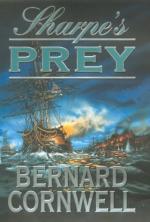
|
| Name: _________________________ | Period: ___________________ |
This test consists of 5 short answer questions, 10 short essay questions, and 1 (of 3) essay topics.
Short Answer Questions
1. What do Sharpe and some others make?
2. To whom does Sharpe introduce himself?
3. Who questions Sharpe along with Gordon?
4. How many guineas does Visser think England sent with Lavisser?
5. Who is Jems?
Short Essay Questions
1. Where does Sharpe go with Astrid and how does it affect him?
2. What is said about General Castenschiold's Danish militia?
3. What do General Payman, Lavisser adn the Danish Crown Prince discuss?
4. What does Sharpe give Jems and tell him to do?
5. What does the leter to General Payman from the British say and what is Peyman's response?
6. What does Castenschiold plan to do in response to the British presence?
7. What does Pumphrey say to Sharpe about his Army career and how does Pumphrey imply that Sharpe should cooperate?
8. Who does Sharpe see sleeping on a chair and how does he deduce who she is?
9. What is the conversation between Lavisser and Barker about the damage to Lavisser's house?
10. Describe the interaction between Sharpe and Bang at the end of this chapter.
Essay Topics
Write an essay for ONE of the following topics:
Essay Topic 1
"Sharpe's Prey", like many, and perhaps a majority, of novels ends on a happy note. Discuss the following:
1. Why do you think many (most?) people want what they perceive as a happy or good ending to a novel? Explain your opinion. Do you? Why or why? not?
2. What are three reasons to read fiction? Discuss each one in light of "Sharpe's Prey" and whether or not it fulfills all three, two or one of the reasons you mention. Give examples as to why "Sharpe's Prey" is or is not successful in fulfilling the reasons you discuss.
3. Do you think reading solely for entertainment is as good a reason to read as any other? Why or why not? Can any work of fiction or non-fiction, no matter how poorly written, enlighten, teach, stimulate thought? Why or why not?
Essay Topic 2
"Sharpe's Prey: Richard Sharpe and the Expedition to Copenhagen, 1807", is written around the historic invasion of Denmark by the British in 1807. Discuss the following:
1. Research the actual historical event of the invasion of Denmark by Britain in 1807, and write an informative essay on it.
2. Compare/contrast the actual historical event with how it is portrayed in "Sharpe's Prey: Richard Sharpe and the Expedition to Copenhagen, 1807". How are they alike? Different? Why do you think Cornwell alters some of the facts? Do you think the alterations improve the story? Why or why not?
3. Choose some minor historical event and write a short story set in that event. Try to stick to the actual facts as much as possible.
Essay Topic 3
Most of the entire series of novels concerning Richard Sharpe takes place during the Napoleonic Wars; therefore understanding the political and social situation during that time helps to a greater understanding and appreciation of this book and others in the series. Discuss one of the following:
1. Research and write an expository essay about how the Napoleonic Wars begin and end.
2. Research and write an expository essay about the battles that take place on land between Britain and France during the Napoleonic Wars.
3. Compare/Contrast the importance of the British infantry during the Napoleonic Wars to the importance of the British infantry during either WWI or WWII.
4. Write an expository essay on how the Napoleonic War affects the social culture of one of the following countries: Britain, France, or Germany.
|
This section contains 1,146 words (approx. 4 pages at 300 words per page) |

|




